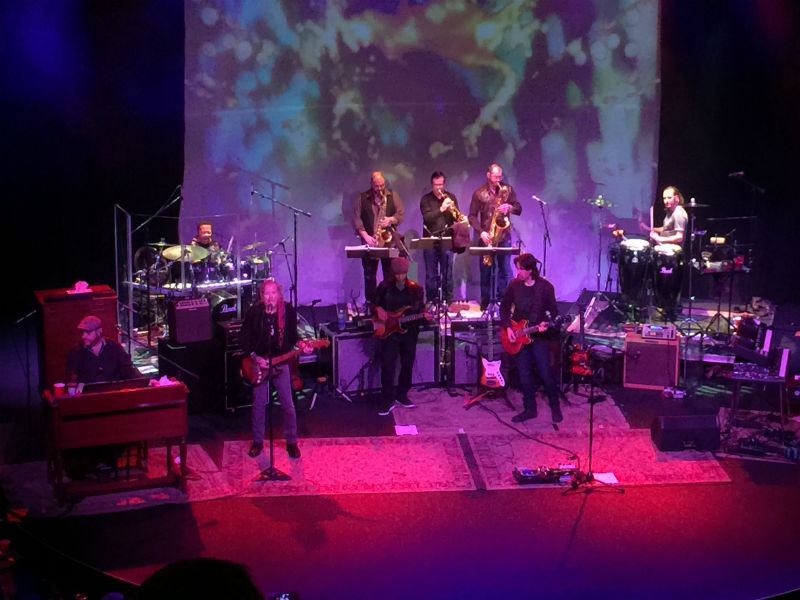Gregg Allman may still be playing cards with old man Fate, and he opened Wednesday night's concert by inviting those whom may have lost money in the casino to come in and drown their sorrows in some blues.
But God knows Allman has drawn many poor cards in his life, and it’s nearly a miracle he survived this long, with an almost savior-like gift for rebirth and renewal – especially in a life that’s been often gritty, unsavory and tragic, marked by the unforgettable deaths of his superlative guitarist brother Duane and Allman Brothers bassist Berry Oakley in a hauntingly similar motorcycle accident a year later. This Allman has borne the weight of drug addiction that very nearly killed him and several trying marriages, including a disastrous one to pop diva Cher.
So the man who played the Northern Lights Theater still has the long blonde hair, beard and tattoos of a spiritual renegade, and many in the enthusiastic crowd perhaps felt like fellow travelers as the 67-year-old singer/songwriter, organist and guitarist transformed some of his trademark songs and put an indelible stamp on a number of blues high-water marks.
His unassumingly magnificent 2011 album "Low Country Blues" reasserted Allman’s profound commitment to the Southern blues idiom, deeply infused with gospel and strains of rock 'n' roll and jazz. The band’s consistently imaginative light show began with an extended tribute to classic bluesmen from Muddy Waters to Blind Lemon Jefferson to Robert Johnson.
So it was no surprise that Allman and his band really opened the floodgates of soulful passion with a stone classic T-Bone Walker song "Stormy Monday Blues," which he recorded on the Allman Brothers’ great "Live at the Fillmore East" album from 1971. Allman has massaged and expanded the tune for all its worth and made it the occasion to introduce his surprise guest performer Harvey Mandel, one the most singular and compelling blues-rock guitar stylists of his generation.
Though he played with Canned Heat and even the Rolling Stones, Mandel has the comparatively low profile career of a brilliant guitarist who doesn’t happen to sing. His guitar takes care of that, with one of the most thickly textural voices on the instrument. Looking gaunt and seated throughout his stint, Mandel at times emits curling fuzz and diverges into searing trash-talk licks of his own sonic language, echoing thick, cavernous notes and sharp rhythmic arabesques.
By contrast, Allman’s music director and lead guitarist Scott Sharrard, is highly fluent, clean-toned and passionate but comparatively conventional. Of course, having more than one top-notch guitarist is a grand Allman Brothers tradition. Right about "Stormy Monday" Allman’s muscular horn section and rhythm sections band pumped the classic blues lament for all its worth.
The show was rich in contrasts with an early song delving as deeply into Allman’s soul as he gets but with fascinating lyrical restraint. The Jackson Browne song "These Days" fits as a tender, bittersweet slice of autobiography for Allman as he struggled with grief in the early 70s. The horns faded away, the song ruminated along gentle sing-song waves and Allman refashioned Browne’s more optimistic ending into a poignantly confessional closing line "Don’t please don’t confront me with my failures/I’m aware of them."
What’s great about Gregg Allman is that he builds on that sense of failure, like a prizefighter or a lonely long-distance runner. Another Allman Brothers tradition has been to liberally rework their material as jazz musicians do.
So some tunes were powered-up fresh, like "Midnight Rider" and the marvelous instrumental "Les Brers in A Minor" from "Eat a Peach" – the latter steaming and pulsing along like a soaring zephyr, though not quite as expansively as back in the double-dagger guitar day of Duane Allman and Dickey Betts. Still, it ended with the sort of glowing fireball of resolution that made that band something to so often savor.
However, at the gig’s end, the band’s trademark rave-up "Whipping Post" lost some of its intensity and extraordinary drama without Allman’s streaming organ (he played guitar on the song) and without the deliciously stunning paroxysm of the repeated, several-octave interval leap near the end that once electrified countless fans. Tell me I just want to re-live the good old days. It’s something all musicians who last this long must deal with.
And perhaps Gregg Allman prepared for that eventuality long ago when he composed the memorable phrase that comes after that climax "Good Lord, I feel like I’m dying!"
But in all, it was an excellent show with only a few technical blunders such as a bit too much bass on the acoustic tunes and, on a few songs, harsh, rhythmically flashing lights from two spots away from the stage which quickly irritated the eyes.
Let’s hope that this Allman brother returns often, before the good Lord feels like he’s dying.







